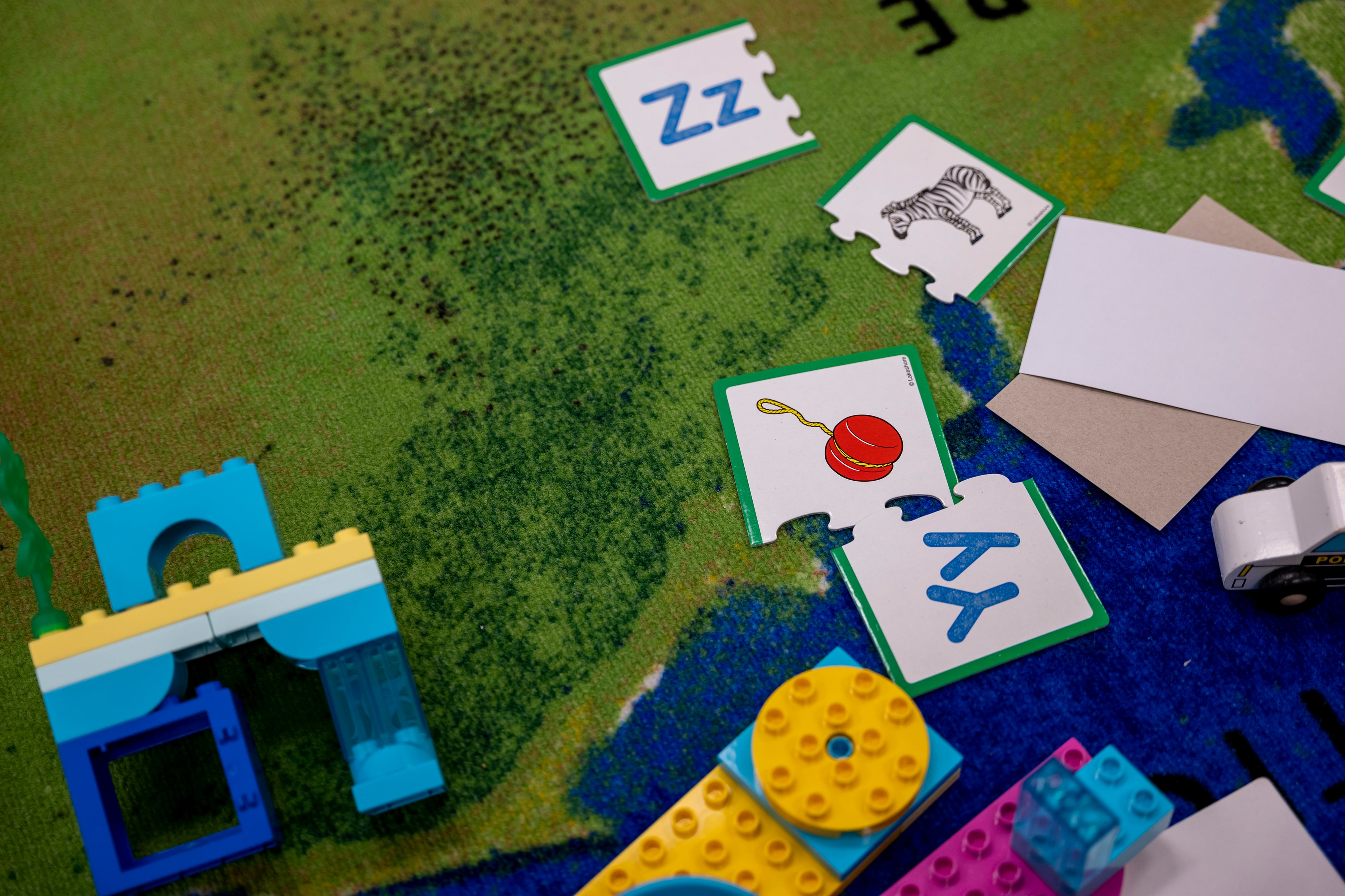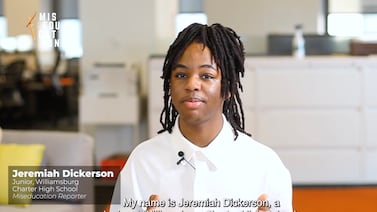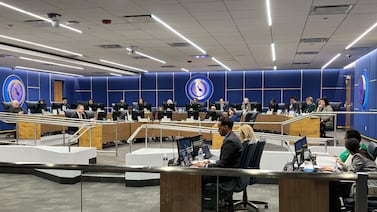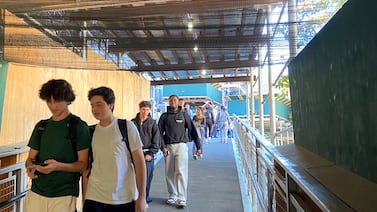At a time when the U.S. Supreme Court has opened the door to greater public funding for private religious schools, a lower court ruling in Colorado could have big implications for the separation of church and state in education.
At the center of the case are two Catholic preschools in suburban Denver that want exemptions from state non-discrimination rules based on sexual orientation and gender identity. The parishes that run the preschools sued the state last year because they didn’t want to have to admit LGBTQ children or children from LGBTQ families if the preschools joined Colorado’s popular new state-funded preschool program.
A federal judge largely ruled in the state’s favor in June. But the preschools are now appealing — and the case could wind up before the U.S. Supreme Court. The Colorado case is one of several unfolding across the country, including in Maine and Vermont, that ask whether religious schools are bound by state non-discrimination rules if they join state-funded programs.
If the Catholic preschools win, it’s possible Colorado children could be shut out of some preschools because of their or their parents’ identities.
Brittany, the mother of a 7-year-old transgender girl, choked up as she talked about the lawsuit.
“It’s so upsetting that there’s so much hate for our kids,” she said. “These kids are just kids. They don’t have a political agenda.”
Brittany’s daughter Naomi is an art-loving, tree-climbing second grader who enjoys reading “Captain Underpants” books and playing pretend with her little sister, who is 4.
The Denver family, who asked that their last name not be used to protect their privacy, is the kind that could be affected by the outcome of Colorado’s Catholic preschools appeal. And if the case — or another one like it — ends up at the Supreme Court, the decision could have a nationwide impact.
Katie Eyer, a law professor at Rutgers University, said, “There are so many of these cases that are currently working their way up through the courts,” she said. “Whether this particular one lands on [the Supreme Court] docket remains to be seen, but it is certainly the type of case that they’ve shown quite a lot of interest in in recent years.”
Colorado invited religious preschools to join state program
As Colorado leaders prepared to roll out universal preschool in the fall of 2023, they invited public and private preschools across the state to join the program. Among them were St. Mary Catholic Virtue School in Littleton and Wellspring Catholic Academy of St. Bernadette in Lakewood, the two schools now at the center of the lawsuit.
The “mixed delivery” approach — meaning both public and private schools can participate — is common in states that fund large preschool programs. In Colorado, it helped ensure there were enough seats available for all of the families that wanted one. This year, about 41,000 4-year-olds are getting half- or full-day tuition-free preschool through the program.
Dozens of religious preschools have joined Colorado’s universal preschool program, including those with Methodist, Lutheran, Jewish, and Muslim underpinnings. One participating preschool is Catholic: St. Columba Catholic Montessori Preschool in Durango.
Experts say that families choose religious preschools for lots of reasons, ranging from a shared faith to factors such as a convenient location, open slots, and high ratings.
But the Archdiocese of Denver wouldn’t let most of the 36 preschools it oversees sign off on the state’s non-discrimination agreement, a requirement to participate.
The big sticking point was the agreement’s protections for people based on sexual orientation and gender identity. Officials from some religious preschools, including from St. Mary, raised their concerns during regular meetings with state preschool leaders before the program launched.
That’s when state leaders mentioned an idea they’d come up with to allow religious preschools who joined universal preschool to reserve some or all of their seats for members of their congregations, according to testimony from the trial last January. But the archdiocese didn’t like that solution because it didn’t want to limit preschool enrollment to only parish members, an archdiocese official testified.
The Catholic preschools instead wanted the state to exempt them from the parts of the non-discrimination rule covering sexual orientation and gender identity. Other religious groups, including an Orthodox Jewish group and a conservative Lutheran group, also expressed interest in exemptions in a letter to Colorado Gov. Jared Polis. State officials refused to grant them, saying non-discrimination protections were part of state law.
“In a sense, church leaders want to have their cake and eat it too,” said Bob Shine, associate director of New Ways Ministry, a Catholic group based near Washington, D.C. that advocates for LGBTQ inclusion.
“They want public funding because in most cases the church cannot sustain a lot of its educational or charitable efforts now, so they need the government money, but they don’t want any of the conditions that come with [it].”
In Denver, the archdiocese this month announced the impending closure of Wellspring and two other Catholic schools due to declining enrollment and financial problems. Last year, the archdiocese closed a K-8 school in Aurora.
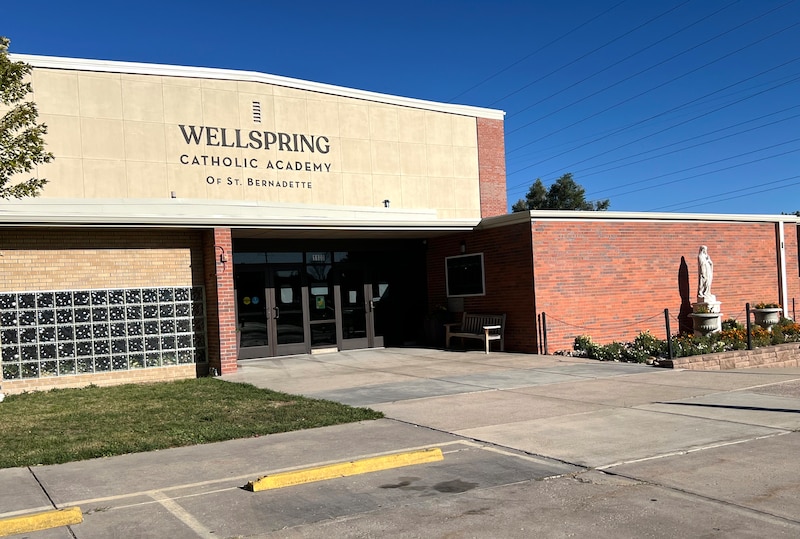
Archdiocese allows some preschools to join state program
While the Denver Archdiocese barred most of its preschools from signing the non-discrimination agreement and joining the state preschool program, there were exceptions. Five preschools under the Archdiocese umbrella signed the form and joined. All serve low-income families and are operated by Catholic Charities of Denver, the Archdiocese’ charitable arm.
Rick Biekers, executive director of early childhood education programs at Catholic Charities of Denver, said the five preschools use a secular curriculum and are open to all families in need.
“We absolutely serve anyone who comes to our doors,” he said in an email.
Lawyers for the Catholic preschools said during the trial that the reason Catholic Charities preschools were allowed to participate in the state preschool program is because they have a different mission than the rest of the Archdiocese preschools. That is, to serve the poor.
In contrast, the other Archdiocese preschools are dedicated to “raising the next generation in the faith,” said Joseph Davis, one of the preschools’ lawyers from the Washington, D.C.-based Becket Fund for Religious Liberty, during the trial.
Another lawsuit over Colorado’s non-discrimination rules
In June 2023, about two months before the Catholic preschools filed their lawsuit, an evangelical Christian school in the southern Colorado town of Buena Vista sued the state.
Busy Bees Preschool, part of Darren Patterson Christian Academy, had signed the state’s non-discrimination agreement and joined the universal preschool program. But school leaders, who are represented by the Alliance Defending Freedom based in Scottsdale, Arizona, said they feared the state rules on sexual orientation and gender identity would force the preschool to hire employees who don’t share its faith and change school policies related to restrooms, pronouns, and dress codes.
The lawsuit is similar to the Catholic preschool lawsuit, which also cited concerns about hiring LGBTQ employees. But unlike the Catholic preschools, Darren Patterson leaders say all children are welcome to enroll in Busy Bees, including those from LGBTQ and non-Christian families.
In October, Darren Patterson won a preliminary injunction that blocks Colorado from punishing the school for policies that don’t align with state non-discrimination rules.
Federal District Court Judge Daniel Domenico, who was appointed by former President Donald Trump, wrote in his decision that those rules force the preschool “into the unconstitutional choice of abandoning religiously motivated practices or foregoing otherwise available public funding.”
No trial date has been set.
Supreme Court grows more sympathetic to religious liberty claims
In recent years, the U.S. Supreme Court has become more conservative and more sympathetic to religious liberty claims, often at the expense of arguments favoring a strict separation of church and state.
In a landmark 2022 Maine case called Carson v. Makin, the high court ruled that religious schools can’t be excluded from publicly funded programs if secular private schools are allowed to participate. But the court didn’t clearly address whether states could require those religious schools to agree to non-discrimination rules in order to participate.
“That then tees up this tension,” said Robert Kim, executive director of the Education Law Center. “The religious schools are arguing, … ‘Having to abide by those non-discrimination policies violates our religious rights.’”
In the Colorado case, Senior U.S. District Judge John L. Kane, who was appointed by former President Jimmy Carter, disagreed with the Catholic preschools on that point in his ruling.
He wrote of Colorado’s non-discrimination rules: “The purpose of the requirement is not to invade religious freedom but to further the implementation of a strongly embraced public value.”
Scott Skinner-Thompson, associate professor of law at the University of Colorado Boulder, said of the opinion, “He makes absolutely clear that it is constitutional and unproblematic for states and local governments to apply LGBTQ non-discrimination provisions to recipients of state funds.”
Sarah Taitz, constitutional legal fellow at Americans United for Separation of Church and State, said court decisions often hinge on whether states apply the rules in a “neutral and generally applicable” way.
In his 101-page opinion, Kane concluded the state met that threshold.
Kane did give the Catholic preschools a narrow win in the case — exempting them from rules banning discrimination based on religion. He did that because of Colorado’s decision to let religious preschools prioritize children from their own congregations. He said the state can’t have it both ways — allowing the congregation preference, which is based on religion, while telling participating preschools they can’t discriminate based on religion.
Mom of trans daughter relieved by ruling on LGBTQ inclusion
Brittany, Naomi’s mother, said she and other parents she’s talked to were relieved by Kane’s decision upholding protections based on sexual orientation and gender identity.
“We were really happy that the ultimate ruling that came out was that you can’t discriminate against our community,” said Brittany, who runs a monthly park play group for transgender children and started the Denver chapter of the national group TransParent
“That just felt really, really nice to hear, even though we kind of think it shouldn’t have been an argument to begin with,” she said.
Brittany said her family was lucky because when Naomi came out as transgender at age 4, the teachers at her private preschool were supportive. They even helped with her daughter’s social transition at school, including the switch in pronouns and her name change. The family has found the same openness at their public elementary school in Denver, where Naomi is in second grade and their 4-year-old attends preschool through Colorado’s universal preschool program.
In both kindergarten and first grade, Naomi told her entire class — with teachers facilitating the conversation — that she was transgender and answered questions from classmates.
“She came home happy and excited and said, “Mom, I told my whole class that I was trans and they’re all still my friends,” she said.
When sharing about her daughter’s gender identity, Brittany said, “It’s never the kids that we worry about.”
Brittany said her in-laws are practicing Catholics and when she and her husband broke the news about Naomi’s gender identity, they felt a twinge of uncertainty.
“Specifically because of their faith, we weren’t sure what their reaction was going to be,” she said. “They just told us that they love her no matter what and have been champions for her and other kids like her.”
Catholic preschools want to avoid “conflict” and “confusion”
The Catholic preschools in the Colorado case describe their refusal to enroll children from LGBTQ families as a way to avoid confusing children who might hear one thing from their parents and another from their preschool teachers.
An Archdiocese education official addressed a slice of those potential conflicts at the trial — noting that teachers at the Catholic preschools wouldn’t use a transgender child’s preferred pronouns, or let them wear uniforms or use bathrooms not associated with their gender at birth.
But it’s unclear what other conflicts might arise, for example, if a preschooler’s parents are gay. During the trial, Avery Coats, co-principal at one of the Catholic schools, described the preschool’s instruction related to gender and sexual orientation as age-appropriate.
“We do this in vocabulary like mommy and daddy and marriage and family,” she said.
Coats referred an interview request from Chalkbeat to Kelly Clark, director of communications for the Archdiocese of Denver. Clark did not respond to repeated email requests from Chalkbeat asking about such conflicts.
Nick Reaves, an attorney from Becket, sent an emailed statement on behalf of the Archdiocese, saying in part, that Colorado has excluded Archdiocese preschools and the families they serve from the universal preschool program “simply for staying true to their faith.”
Amanda Henderson, director of the Institute for Religion, Politics & Culture at Iliff School of Theology in Denver, said the possibility that children from LGBTQ families will encounter contradictory perspectives at school isn’t a new dilemma.
“Let families navigate that on their own,” she said. “LGBTQ families have been navigating a culture that was counter to their family for a long, long time.”
Ish Ruiz, assistant professor of theology at Pacific School of Religion, said keeping children from LGBTQ families out of Catholic preschools won’t prevent other students from asking about or sharing what they see in their daily lives.
“That 4-year-old will show up to the classroom … saying, ‘My friend Tommy who doesn’t go to this school has two mommies or two daddies,’ or ‘I have an uncle who’s married to his husband,’” he said. “You cannot sanitize the school from reality.”
Catholics have diverse opinions on LGBTQ issues
Despite guidance crafted by the Archdiocese of Denver that calls for the exclusion of LGBTQ students and families from some schools, not all Catholics agree with the stance.
“The church is not a monolith,” said Ruiz. “The church, in and of itself, has a lot of internal disagreement on the matter.”
Henderson said diverse opinions within the church create a thorny job for the courts.
“It becomes really difficult when a specific court is defining … what a religious belief is or whose religious belief is prioritized over others,” she said.
Beth Mueller Stewart and her husband Dan Stewart are practicing Catholics who disagree so strongly with the Catholic preschools’ argument, they urged the Archdiocese to drop the lawsuit.
In a May letter to Aquila and other church officials, published on the New Ways Ministry web site, the couple described the “tough position” they were in.
“The lawsuit forced us to ask: ‘Do we keep our child at Wellspring Catholic Academy and seemingly support the lawsuit, forsaking our values and our consciences? Or do we forgo Catholic education at Wellspring to stand in solidarity and love with our own LGBTQ loved ones?’”
Ultimately, they withdrew their child from the school.
Meanwhile a Catholic family with a preschooler at St. Mary Catholic Virtue School, joined the two Catholic parishes in suing the state over the non-discrimination agreement. The mother, Lisa Sheley, is a front office coordinator at St. Mary school, and testified at the January trial.
She said she and her husband Dan feel it’s important to give their six children a Catholic education. If St. Mary had participated in Colorado’s universal preschool program, her family would have saved nearly $5,000, she said.
“Obviously with inflation, everything is extremely expensive, but even more so for a family of eight,” she said. “So, anything we could save would be extremely helpful.”
Lisa Sheley could not be reached for comment, including through her lawyers.
Will Colorado’s preschool case lead to K-12 impacts?
In the near-term, the outcome of the Catholic preschools case — or the cases unfolding in Maine and Vermont — won’t affect Colorado’s public K-12 education system.
That’s the question at the heart of another lawsuit over Colorado’s preschool program, as well as lawsuits in Maine and Vermont. In those two states, religious schools want exemptions from rules about sexual orientation and gender identity so they can participate in state programs that cover private school tuition for students who live far from public schools.
But there could be spillover eventually, experts say. Considering Colorado’s charter-friendly environment, an unprecedented effort in Oklahoma to create a charter school run by the Catholic church shows one way that might happen. Charter schools are free publicly funded, privately managed schools.
While the Oklahoma Supreme Court in June ruled the Catholic charter school unconstitutional, the Archdiocese of Oklahoma City has appealed to the U.S. Supreme Court.
“Lurking in that case is this notion that a religious entity could not only seek to participate in public programs, but actually become a public school,” said Kim, of the Education Law Center,
The idea of normalizing public funding for private religious education is concerning, he said “especially if in that process, there’s an erosion or evisceration of non-discrimination principles.”
Already many states have voucher programs that provide students funding for private school tuition, including at religious schools with anti-LGBTQ policies. Colorado has no voucher program, though some experts worry that Amendment 80, a ballot measure up for a vote in November, is a step in that direction.
Despite years of questions about potentially discriminatory practices at voucher-accepting schools, Taitz said the legal questions are a bit different than Colorado’s Catholic preschool case. That’s because in voucher programs, schools don’t get funding directly from the state. Instead, families are the go-between.
“But in terms of some of the principles at stake about discrimination and separation of church and state, vouchers pose a similar, really major problem,” she said.
Ann Schimke is a senior reporter at Chalkbeat, covering early childhood issues and early literacy. Contact Ann at aschimke@chalkbeat.org.

